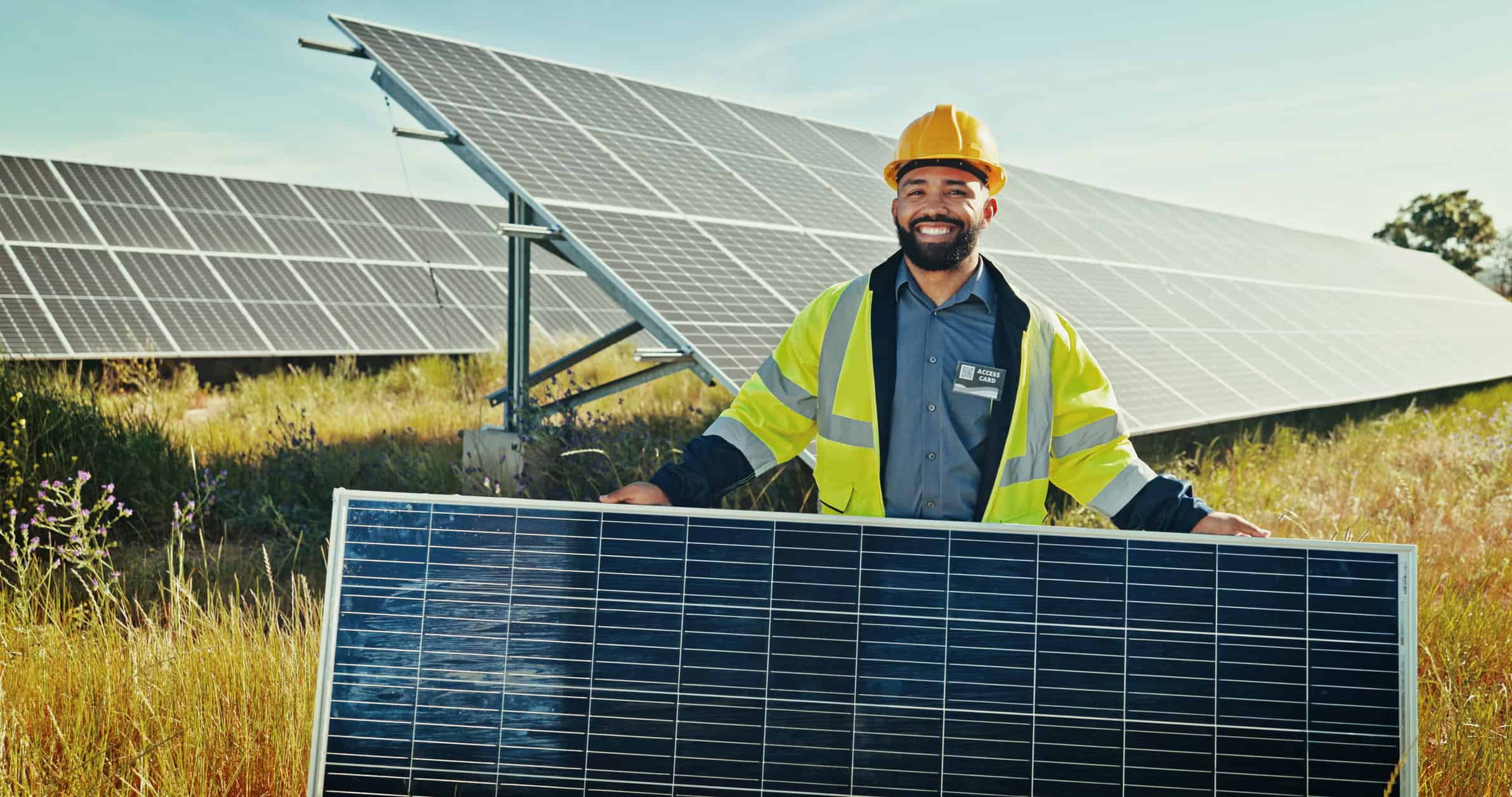Table of Contents
As the renewable energy industry experiences unprecedented growth, ensuring worker on-job safety is an essential aspect of its success. With solar farms stretching across deserts, wind turbines towering over plains, and bioenergy plants transforming waste into power, the potential hazards for workers in this sector are as varied as the technologies themselves. This article explores the unique safety challenges of the renewable energy industry, examines real-world strategies to address them, and highlights JMS Energy’s commitment to upholding the highest safety standards.

Understanding the On-Job Safety Challenges in Renewable Energy
The renewable energy industry encompasses a wide range of technologies, each with its own unique risks. From solar panel installation to wind turbine maintenance, employees face a host of safety concerns that require careful planning and mitigation.
1. Falls from Heights
Wind turbine technicians and solar installers frequently operate at great heights, exposing them to the risk of falls. Wind turbines often exceed heights of 280 feet, and the climbing process alone presents challenges. The National Safety Council identifies falls as one of the leading causes of workplace injuries and fatalities across all industries, and in renewable energy, the risk is amplified by environmental factors such as strong winds and extreme weather conditions.
2. Electrical Hazards
High-voltage equipment is a staple in renewable energy systems. Workers who install, repair, or maintain photovoltaic (PV) panels or wind turbines are at risk of electrocution or arc flash incidents. Solar panel installations involve direct current (DC) circuits, which can pose additional dangers due to their constant flow of electricity.
3. Confined Spaces
Many renewable energy maintenance tasks require entry into confined spaces, such as wind turbine nacelles or underground storage areas in geothermal plants. Confined spaces can present risks like low oxygen levels, exposure to hazardous gases, and difficulty in emergency evacuation.
4. Moving Machinery
Renewable energy facilities often feature complex machinery. Without proper training and safety protocols, workers are at risk of injuries caused by moving parts, chemical burns, or even explosions. According to the Occupational Safety and Health Administration (OSHA), improper machinery operation is one of the most common safety violations.
5. Hazardous Substances
The handling of hazardous chemicals, such as those used in battery storage systems or bioenergy processes, can result in serious health risks. Exposure to these substances, if improperly managed, can lead to burns, respiratory issues, or long-term illnesses.
6. Extreme Weather Conditions
Many renewable energy projects are located in remote or harsh environments, such as deserts for solar farms or offshore sites for wind turbines. Workers are often exposed to extreme temperatures, storms, or even freezing conditions, which can contribute to injuries or illnesses.
Best Practices for Enhancing On-Job Safety
To address these challenges, renewable energy companies must adopt comprehensive safety strategies tailored to their specific operations.
1. Comprehensive On-Job Safety Training
Training programs must be tailored to the specific hazards of the job. For example, wind turbine technicians should receive training on safe climbing techniques and fall protection equipment, while solar panel installers should learn about electrical safety protocols. Regular training updates help workers stay informed about new technologies and evolving risks.
2. Routine Equipment Maintenance
Properly maintained equipment is essential to preventing accidents. Conducting regular inspections and promptly addressing mechanical issues can mitigate risks. Documentation of maintenance activities not only ensures compliance with safety regulations but also fosters a culture of accountability.
3. Utilizing Personal Protective Equipment (PPE)
Personal protective equipment (PPE) is a cornerstone of workplace safety. Helmets, harnesses, gloves, and protective eyewear are critical for safeguarding workers. Ensuring proper use and maintenance of PPE is equally important—ill-fitting or damaged equipment can reduce its effectiveness.
4. Conducting Risk Assessments
Before any project begins, companies should conduct thorough risk assessments to identify potential hazards. This includes analyzing environmental factors, evaluating equipment safety, and developing mitigation strategies for identified risks. Regular audits ensure ongoing safety compliance.
5. Emergency Preparedness Plans
Emergency response plans are vital in mitigating the impact of workplace incidents. Companies should establish clear protocols for evacuations, first aid, and rescue operations. Conducting regular drills helps ensure that workers are prepared to act swiftly in real-life scenarios.
6. Embracing On-Job Safety Technology
Advancements in technology have opened new opportunities for enhancing safety. Drones, for instance, can inspect wind turbines and solar farms without putting workers at risk. Wearable devices, such as smart helmets or harnesses with sensors, can monitor worker health and alert teams to potential dangers.
7. Promoting a Safety Culture
Creating a workplace culture where safety is prioritized at every level fosters greater awareness and vigilance among employees. Encouraging open communication about safety concerns and rewarding proactive behavior are effective ways to build this culture.
Case Study: JMS Energy’s Safety-First Approach
JMS Energy exemplifies how renewable energy companies can prioritize safety while delivering world-class services. Safety is a core value integrated into every aspect of JMS Energy’s operations, from project planning to execution.
- Leadership Commitment: JMS Energy’s leadership actively promotes a culture of safety, setting the tone for the entire organization. Managers and executives lead by example, ensuring that safety is not just a policy but a daily practice.
- Employee Empowerment: Workers are encouraged to take an active role in safety practices, from identifying potential hazards to participating in safety committees. This inclusive approach fosters accountability and collective responsibility.
- Comprehensive Safety Policies: JMS Energy employs rigorous safety protocols tailored to the unique demands of renewable energy projects. These include fall protection systems for wind turbine technicians, electrical safety guidelines for solar panel installations, and confined space procedures for maintenance teams.
- Continuous Improvement: The company conducts regular safety audits and incorporates feedback from employees to refine its practices. By staying ahead of industry trends and embracing innovation, JMS Energy ensures that safety measures evolve with the industry.
Why Safety Matters in Renewable Energy
The importance of on-job safety extends beyond compliance with regulations. A strong safety record has far-reaching benefits, including:
- Worker Well-Being: Ensuring safety reduces injuries and illnesses, fostering a healthier, more satisfied workforce.
- Operational Efficiency: Minimizing accidents reduces downtime and associated costs, allowing projects to stay on schedule and within budget.
- Industry Reputation: A commitment to safety enhances a company’s reputation, making it an attractive partner for clients and investors.
- Environmental Stewardship: Safe practices minimize the risk of environmental incidents, aligning with the industry’s broader mission of sustainability.
The Future of Safety in Renewable Energy
As renewable energy technologies continue to advance, so too must safety practices. Emerging trends, such as the integration of artificial intelligence in safety monitoring and the development of new materials for PPE, promise to make the industry even safer. However, the foundation of safety will always be a commitment to protecting the people who power the green revolution.
Conclusion
On-job safety in the renewable energy industry is not merely a regulatory obligation—it is a moral imperative and a key driver of success. By understanding the unique challenges of this sector and implementing comprehensive safety strategies, companies can protect their workers while contributing to a sustainable future. JMS Energy’s unwavering dedication to safety serves as a model for others, demonstrating that prioritizing safety leads to better outcomes for employees, businesses, and the planet.


















